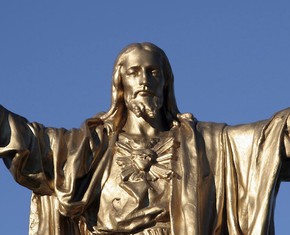The views expressed in our content reflect individual perspectives and do not represent the authoritative views of the Baha'i Faith.
Time, as we all know, moves in just one direction — forward, always forward. Could it ever stop, or slow down, or even move backwards?
Throughout history countless curious writers, philosophers, and scientists have pondered that question, contemplating the linear nature of the onward progress of the ticking time clock that regulates this material existence, and wondering how we might possibly step outside of its relentless tyranny.
But nobody has a time machine.
RELATED: How the Bab’s New Calendar Transforms Time
Time moves on, second after second, in mounting minutes, hours, and days. Once the present turns into the past, we’ve lost it forever. The clock and the calendar stop for no one — which may explain why the Baha’i teachings designate a special period each year for joy and gladness that symbolically transcends time, the annual Baha’i holy days known as Intercalary Days, or Ayyam-i-Ha.
Baha’is all around the world are celebrating those holy days right now, remembering that an eternal Creator is not bound by physical time. That timeless concept — as well as the definition of the Arabic word “Ha” — takes some explaining to understand.
Here’s how it works on the physical level: every year, the four-day (or five-day, in a leap year) Baha’i Intercalary period precedes the last month in the Baha’i calendar, known as “Ala,” or “Loftiness.” During that subsequent month, Baha’is all over the world take part in the annual Baha’i Fast, 19 days of inner reflection, abstention from food and drink during the daylight hours, and prayer and meditation. During the Fast, this “season of restraint,” as Baha’u’llah called it, Baha’is endeavor to observe:
… a period of meditation and prayer, of spiritual recuperation, during which the believer must strive to make the necessary readjustments in his inner life, and to refresh and reinvigorate the spiritual forces latent in his soul. Its significance and purpose are, therefore, fundamentally spiritual in character.
On a more spiritual level, during the Baha’i month of fasting and in the Intercalary days that precede it, our limited human perceptions can sometimes allow us a brief impression, an experience of the transcendent reality beyond the mere material aspects of our existence — or, as Shoghi Effendi, the Guardian of the Baha’i Faith, put it in the book “Principles of Baha’i Administration,” gazing “beyond the curve of time:”
Meditating upon these sublime attributes, man is enabled to gaze beyond the curve of time, wherein the swing and change of planetary movements exists, to the eternal qualities that stabilize the soul. As the seasons return with their quaternary beauty, as the seed sacrifices to the mystery of the harvest, we see reflected in the mirror of the physical world the spiritual spring-time when the Word of God is planted in the heart of man by the coming of God’s Messengers.
RELATED: The Inner Meanings of the Baha’i Intercalary Days
So the Baha’i observance of Ayyam-i-Ha — which literally means “the Days of Ha” – in one sense represents the act of transcending that “curve of time.” The Baha’i Intercalary Days are named after the Arabic word Ha, the fifth letter of the Arabic alphabet, because it symbolizes the timeless essence of God, as just one of its many meanings.
During the Baha’i Intercalary Days, those sacred days “outside of time,” unbounded by any specific month in the calendar, we can all celebrate and commemorate the greatness of God beyond any individual attributes we associate with the Supreme Being. Baha’u’llah, the prophet and founder of the Baha’i Faith, wrote:
We have ordained that these, amid all nights and days, shall be the manifestations of the letter Ha, and thus they have not been bounded by the limits of the year and its months. It behoveth the people of Baha, throughout these days, to provide good cheer for themselves, their kindred and, beyond them, the poor and needy, and with joy and exultation to hail and glorify their Lord, to sing His praise and magnify His Name …
So during these Intercalary Days the joy, good cheer, and exultation of the world’s Baha’is encourages everyone to celebrate the liveliness and exuberance the Creator has instilled in all of us.
















Comments
Sign in or create an account
Continue with Googleor